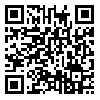Volume 6, Issue 1 (Winter 2020)
Caspian J Neurol Sci 2020, 6(1): 66-70 |
Back to browse issues page
1- Kavosh Behavioral, Cognitive and Addiction Research Center, Department of Psychiatry, Shafa Hospital, Guilan University of Medical Sciences, Iran
2- Kavosh Cognitive Behavioral Sciences and Addiction Research Center, Department of Psychiatry, School of medicine, Guilan University of Medical Sciences, Rasht, Iran
3- Pharmacy Faculty, Mashhad University of Medical Sciences, Mashhad, Razavi Khorasan, Iran ,mjalali74@gmail.com
2- Kavosh Cognitive Behavioral Sciences and Addiction Research Center, Department of Psychiatry, School of medicine, Guilan University of Medical Sciences, Rasht, Iran
3- Pharmacy Faculty, Mashhad University of Medical Sciences, Mashhad, Razavi Khorasan, Iran ,
Abstract: (2390 Views)
Background: Ginseng has long been used as a tonic and panacea, a dietary supplement, or a therapeutic agent in different countries. Among many common side effects for this herbal, the affective disorder is one of the rare ones.
Case presentation and Intervention: We present a case of mania with psychotic features. The patient was an 18-year-old male who consumed Asian red ginseng for five months to treat his overweight. His physical examination was normal except for mild mental retardation. Mental status examination revealed increased psychomotor activity, anxious mood, unstable affect, irritability, aggression, pressured speech, grandiosity, auditory hallucinations, and persecutory delusions. After the admission, he was ordered to stop ginseng taking and supportive care and treatment with risperidone, lorazepam, and valproate sodium started. After 15 days, all symptoms were treated.
Conclusion: Despite the widespread use of herbal and dietary supplements, physicians and health care providers should be concerned about the side effects of these products, such as mania and psychosis.
Case presentation and Intervention: We present a case of mania with psychotic features. The patient was an 18-year-old male who consumed Asian red ginseng for five months to treat his overweight. His physical examination was normal except for mild mental retardation. Mental status examination revealed increased psychomotor activity, anxious mood, unstable affect, irritability, aggression, pressured speech, grandiosity, auditory hallucinations, and persecutory delusions. After the admission, he was ordered to stop ginseng taking and supportive care and treatment with risperidone, lorazepam, and valproate sodium started. After 15 days, all symptoms were treated.
Conclusion: Despite the widespread use of herbal and dietary supplements, physicians and health care providers should be concerned about the side effects of these products, such as mania and psychosis.
Type of Study: case report |
Subject:
Special
Received: 2020/05/23 | Accepted: 2020/05/23 | Published: 2020/05/23
Received: 2020/05/23 | Accepted: 2020/05/23 | Published: 2020/05/23
| Rights and permissions | |
 | This work is licensed under a Creative Commons Attribution-NonCommercial 4.0 International License. |





